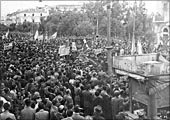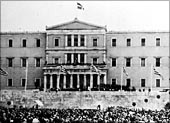| Introduction: Liberation
The rapid advance of the Soviet army towards the Balkans, threatening to cut off the German forces in Greece, forced the Germans to withdraw immediately. Their departure began from the Peloponnese and the islands, while on 12 October 1944 Athens and Piraeus were liberated amidst a huge popular frenzy. Greek flags and the pealing of bells filled the capital while crowds of people inundated the streets and squares, celebrating with enthusiasm. British troops were eagerly received in the capital while celebrations culminated with the arrival of Papandreou and the government of national unity on 18 October.
However, behind the atmosphere of celebration and licence in these first days of Liberation, there loomed problems and conflicts that in no time were to burst forth, culminating in the tragedy of the civil war.
Greece came out of the war practically destroyed. Greek casualties during the four-year occupation and resistance struggle had been enormous: the number of dead in battles, of those executed and assassinated, or killed as hostages in the German camps and of those who died of famine and hardship reached around 500,000. Burnt-out buildings of every kind were estimated at 155,000 while families whose houses were burnt down topped 111,000 for the whole of Greece. Moreover, 1,700 Greek villages were destroyed by fire. Damage to the economy was estimated at a 40-80% decrease in farming production, a 50% decrease in animal husbandry capital for big animals and 30% for small ones, a reduction of forests by 20%, destruction of metal installations and stagnation of metal production, reduction of industrial
 |
 |
production by 50%, destruction of transportation (that is, railroad rolling stock and track and road network), plunder of 70% of cars, destruction of harbours and the Corinth canal, and the loss of 73% of the country's trade and passenger shipping.
For Greece, the transition from war to peace brought back onto the agenda the demand for recognition of the nation's claims for the integration of the territories of North Epirus, Cyprus and the Dodecanese islands. The role the country had played in the Allies' struggle and the principles included in international declarations, such as the Atlantic Charter (August 1941) and the Charter of the United Nations (June 1945), caused optimism for the upholding of the Greek claims. Besides, there had been frequent negotiations concerning these issues both between the Greek and British governments and among the Great Powers during the war.
Yet of the Greek expectations, only those concerning the integration of the Dodecanese islands was gratified; this materialized with the Paris Convention in February 1947. The claims for the territories of Cyprus and North Epirus were quashed due to the Great Powers' preference - against the implementation of the declared principles - to keep the balance of power and to avoid new agitation in the wider area. According to their estimations, the consequences that the integration of North Epirus and Cyprus into Greece would have concerning the balance of the area, and Greece's own inertia in the period of negotiations due to domestic turbulence, led to the exclusion of these areas from the national boundaries. With the annexation of the Dodecanese islands, Greece acquired its definite frontiers.
|






